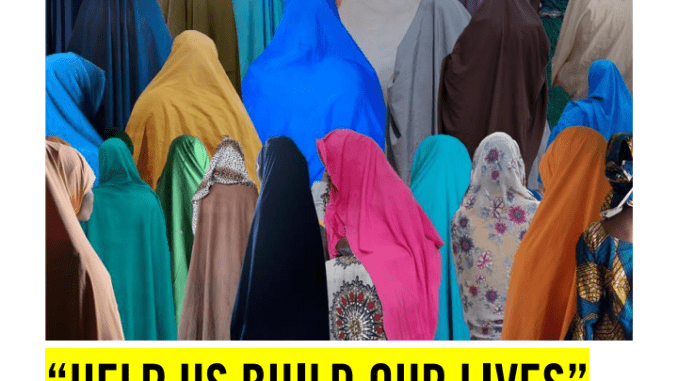
Amnesty International, an International Nongovernmental Organization (INGO) working on human rights campaigns has presented a report on survivors of terrorism and abuse by military in the northeast region of Nigeria.
The INGO said that they are demanding for justice to the survivors from both the terrorist group and Nigerian government.
According to the organization, the survivors, mostly girls and young women, endured several years of torture, rape, forced marriage and other forms of Gender Based Violence (GBVs) from the Boko-Haram terrorist group in the region.
The report, made available to journalists, also made several allegations on the Nigerian military who are said to have abused some of these survivors in detention after their escape from the terrorists.
The INGO made the presentation of the report to newsmen at a press conference on Thursday in Borno State’s capital, Maiduguri.
At the conference, some of officials of the organization briefly highlighted some key areas of the report, noting that the aim is to seeks juctice for the survivors against the accused and also attract support that would help them recover from their unfortunate experiences.
They noted that like everyone else, the survivors also have dreams and future ambitions, hence, the need for campaigns and support to help them actualize it.
In his brief remarks, Isa Sanusi, director, Amnesty International, Nigeria highlighted the importance of the campaign, noting that they have so far attracted support from foreign donors who has pledged to finance the education of some of the survivors.
Sanusi however explained that the campaign is not an easy task, especially with regards to institutions like the military who usually denied such allegations, and that it is a continues process that needs dedication, resilience and support from other stakeholders.
”They were subjected to sexual slavery, and many were forced to bear children with their captors. After escaping, some fell into the hands of the military, only to face further atrocities, leaving them trapped in a cycle of violence, moving from one nightmare to another,” he said.
Responding to questions from the newsmen, Mr. Sanusi noted that Amnesty International programs is not only limited to advocacy and campaign for justice for the survivors, citing example from a recent court case filed by the organization on behalf of the survivors.
“Amnesty International has recently filed a case in the International Criminal Court on behalf of the survivors against Boko-Haram and the military,” he said.
He added that such efforts did not start with or limited to Boko-Haram terrorists and the Nigerian military but many other actors of human rights abuses across the world.
Also speaking, Fatima Diallo, a regional official of Amnesty International said that activists and journalists have a big role to play in the advocacy and campaign against human rights abuses and seeking for justice for survivors of terrorism and other abusers.
She noted that part of their campaign is a petition against the perpetrators of injustice, signed by thousands of activists and other human rights promoters.
While acknowledging the contribution of some activists in the campaign, Diallo said that journalists most continue to tell stories of the survivors to enable them get access to justice and revive their means of livelihood.
“Their stories matters, they want us to be there for them, to be their voices,” she added.
Diallo also called on government and the public to grant social and phycological support to the survivors and empower them to achieve their dreams.
In the report, Amnesty International has presented and quoted several survivors of terrorists and military abuses.
According to the organization, over 40 survivors, girls and young women were interviewed as part of the report.
The reported highlighted that “thirteen girls and young women interviewed by Amnesty International were forcibly married to Boko-Haram multiple times: seven of them twice and six of them three times.
“When their “husbands” died, mostly during combat, the girls would typically observe iddah , a period of “mourning”, and then would often beforcibly married again.”
Also quoting one of the survivors, the report said “two among us disagreed. They were a bit older. They killed the two girls that disagreed…all kneeling down, they just killed them immediately with a gun, when we saw, we all agreed.”
“When my husband died, they [Boko Haram] took me again and they brought me to Madagali. They kept us there andlocked us. We stayed a while. Soldiers started attacking.
“When we reached Sambisa Forest, they decidedto get me married after mourning. I said no, I want togo back home. They said they will kill me if I do not getmarried. So, I agreed … I stayed married for almost two years.
“A month after SB’s second “husband” died, “ [Boko Haram] asked me to get married, I said no. They put me in handak and they flogged me. They married me a third time,” the report quoted another survivor identified as SB.
